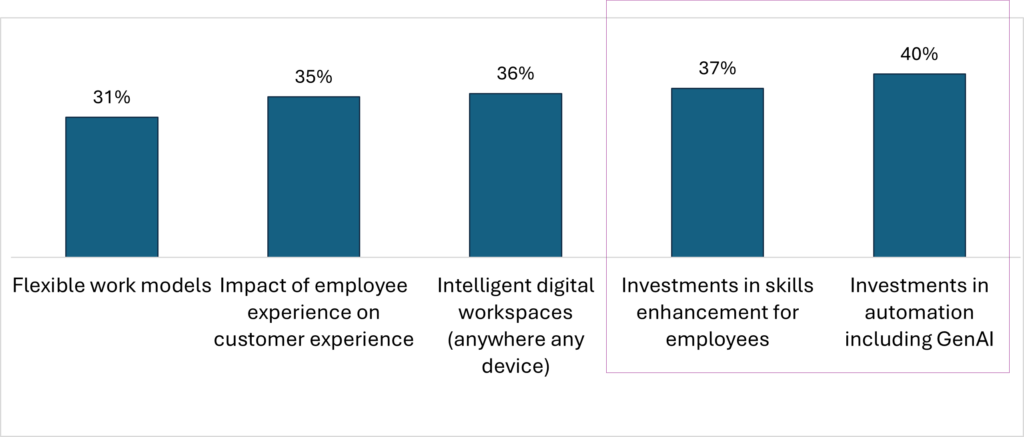There’s no way around it. The time to plan for AI skills and roles is now. Just a year into the GenAI hype cycle, the question is no longer whether enterprises must skill up employees for the age of AI. It’s when and how they should do it.
For leading organizations in every sector, the heat is on. According to IDC data excerpted in IDC’s Skills and the AI-Enabled Business study, some 40% of enterprise and line-of-business respondents believe their GenAI tech investments will continue in the foreseeable future. That was slightly ahead of their IT skilling investments, which 37% of respondents predicted would be the most persistent investment moving forward.
FIGURE 1 : AI and Skills for Business Growth

The two topics – GenAI and skills – are directly related. Organizations in all sectors and geographies face a widening shortage of IT skills, including skills related to security, cloud, IT service management and AI. And in addition to being the subject of skills development, GenAI technologies can and do speed training. But there’s a wider aspect for enterprises to consider, too. Organizations must make sure leaders, employees, partners and, eventually, customers become fluent with the AI and GenAI-fueled tools and processes. Soon these will be foundational to most business processes.
Amid growing IT skills shortages, the stakes are high. To remain competitive, global IT and business leaders must move to accept and deploy AI as a transformational force, one that will fully remake roles, skills requirements, and the very nature of innovation and creativity in the enterprise. This article presents three strategies business and IT stakeholders should embrace now to ready their enterprises for the age of AI moving forward.
1. Implement GenAI to Improve and Speed Training For All Skills
As the IDC AI study notes, enterprises across geographies already face a severe IT skills shortage. Now they face rising demand for AI and GenAI capabilities, too, a reality that exacerbates the substantial skill gaps so many enterprises now report.
Some 30% of IT and LOB leaders see skills and labor shortages as top risk factors for tech strategies and budgets in the coming year. In IDC’s Future Enterprise Resiliency (March 2024), 62% of IT leaders told IDC that a lack of skills had resulted in missed revenue growth objectives (IT Skills Survey, Jan. 2024).
More than 60 percent say the dearth of skills also has led to quality problems and a loss of customer satisfaction overall. And IDC predicts that, by 2026, more than 90% of organizations worldwide will feel similar pain, adding up to some $5.5T in losses caused by product delays, impaired competitiveness and lost revenue.
Notably, GenAI can help to improve IT training outcomes. In fact, more than half of IT leaders tell IDC they have already begun leveraging GenAI tools to create and update courses (42%) and analyze skill assessment interviews and transcripts (46%). Down the road, IDC expects IT training tools to add more AI and GenAI technology. That will allow for personalizing courses to the skills, roles and learning styles of employees, a development that should add up to faster and better skilling outcomes overall.
At this writing, almost every major IT training platform has either announced or delivered GenAI features to help personalize training. These features include GenAI chatbot tutors for enterprise learners, simulations to help tech staff practice problem-solving and AI-powered games and challenges for skill and learning reinforcement. Some training programs now leverage AI to adapt content to the pace, learning style and role of the learner. Digital Adoption Platform (DAP) vendors are following suit, too. Most major players in the category now or soon will offer rich AI data analytics that help enterprises identify learning patterns and bottlenecks.
2. Focus on Developing a Holistic Array of Skills
No enterprise survives on just tech skills alone. To compete in the age of AI. They also need digital business skills, leadership skills and human skills.
Likewise, employees in HR, marketing and communications need to better understand the nature and technical dependencies of new applications essential for guiding their teams. Absent of sufficient technical knowledge and critical judgement about how things function, they will end up misguiding them.

When considering skill gaps in the enterprise, be sure to account for the broad swath of skills employees will need to get the job done. Take time to map the skills each role now requires against what skills will be needed in the foreseeable future.
3. Deliver AI Training Across the Organization
In addition to focusing on the technical, leadership and human skills around AI and GenAI, enterprises should take care not to lose focus on the humans who truly power a business. In a recent 2024 IDC survey, only 36% of organizations told IDC they are mandating AI and GenAI awareness. Enterprises must do a lot better than that. Without proper support and socialization to help humans learn how to work and partner with AI systems, AI initiatives will fall short.
Start with awareness. That is the key to any successful tech implementation, but it is most critical with AI and GenAI which, understandably, can make employees nervous about losing their jobs. Implement mandatory training sessions, workshops and seminars to ensure that employees understand how AI and GenAI play into company strategy overall. They must understand how the organization intends to use such tech to enhance current roles and create new ones.
Automation, after all, isn’t new. Employees should understand that GenAI and AI simply continue and accelerate the need for upskilling and cross-skilling. While dispelling any misconceptions about AI-based automation stealing jobs, leaders should highlight exactly how AI can augment human capabilities. Frame the promise of AI in terms of reassigning rote work, which allows employees to focus on more strategic tasks.
FIGURE 3: Automation technologies impact on employees over 18 months

With AI and GenAI, enterprise leaders should create and foster a culture of trust that keeps humans in the loop. CIOs should create an environment where employees can securely experiment with AI tools, learn from their mistakes and get feedback. Make sure to set up regular team meetings where stakeholders across all functions – not only technical roles – can openly discuss AI projects and results. Transparency matters.
In addition to changing job roles, AI and GenAI technologies are already making an impact on how marketers create content, how HR reps seek out and hire new talent and how financial analysts offer loans. The list of functional use cases goes on, mandating that organizations invest in continuous learning and skill development in technology.
As AI and GenAI evolve, so too, will the skills needed to work effectively with them. CIOs should invest in continuous learning and development programs to ensure their teams keep up with the latest AI trends and technologies. The goal isn’t to turn every employee into an AI expert, of course. But each employee does need to know how and when to partner with AI, and they must do so with best practice AI ethics and compliance in mind.
By focusing on augmenting the capabilities of employees and fostering a culture of learning and AI-human collaboration, organizations can better navigate the challenges and seize the opportunities of the AI age.
Contributing author: Amy Loomis, Ph.D. – Research Director, Future of Work
Learn what matters most to your customers with IDC’s AI Use Case Discovery Tool—find out more.




